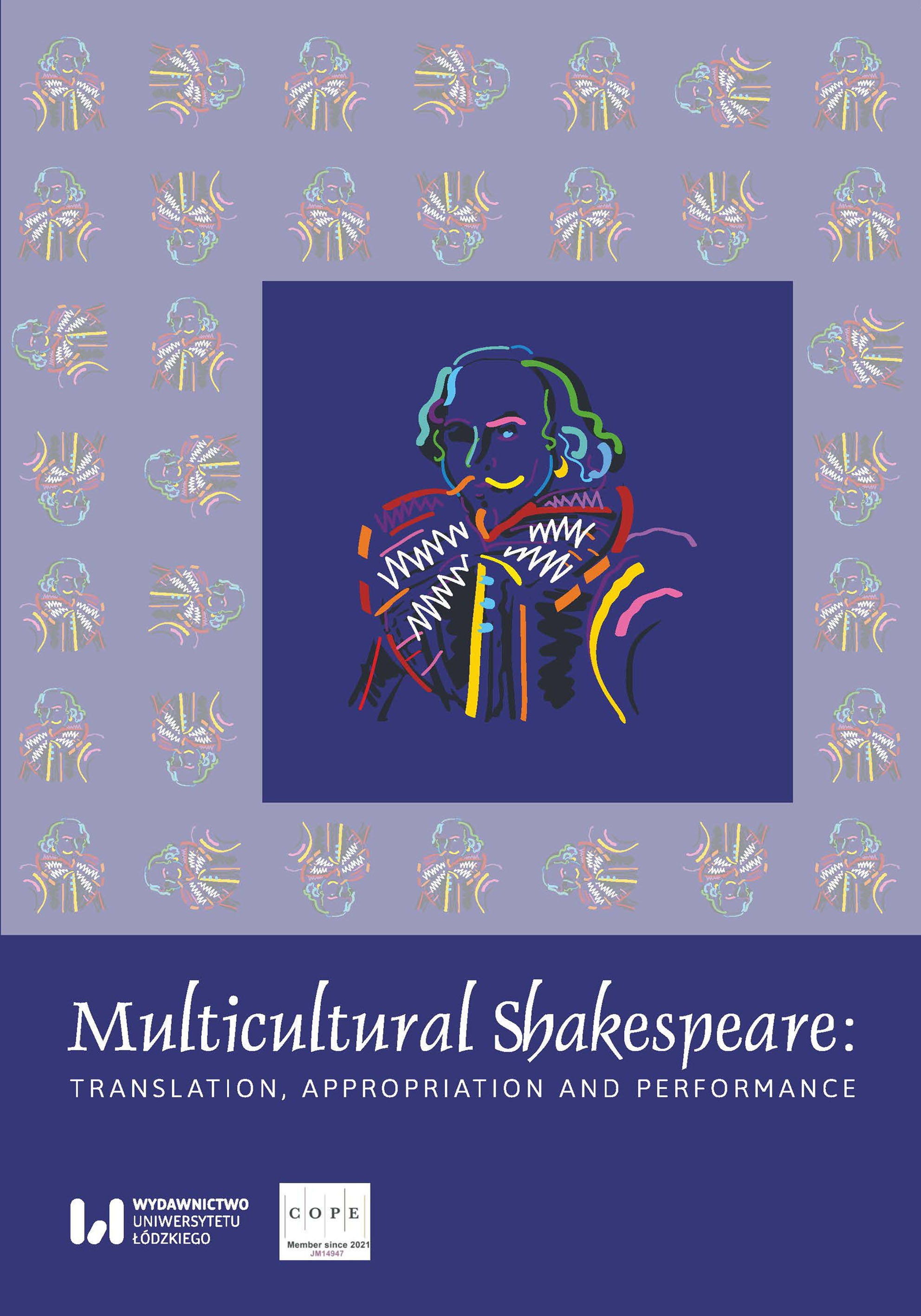Historicizing the Bard of Avon: Shakeshifting Shakespeare and the Constitution of Guarati Literary Culture
DOI:
https://doi.org/10.18778/2083-8530.30.08Keywords:
Shakespeare, Gujarati Literary Culture, Parsi Theatre, translation, adaptation, literary historiographyAbstract
In a century and a half of his continuous presence in India, Shakespeare has shapeshifted into manifold textual and performative “avatars,” from an agent of moral edification transforming into a subversive stick with which to beat the imperial culture. The “Bard” adapted to his immediate environs like a chameleon on the one hand, while standing tall on his native stage, on the other, asserting the imperial will and throwing the native cultural background in sharp relief. The Gujarati theatre and literary histories have borne witness to this ceaseless transformation. The present paper traces the high points in the histories of the “Bard’s” localization—from Shakespeare to Sheikh Pir—as well as his “non-localizations,” examining in the process how they reflect the evolution of the Gujarati literary culture along the caste, ethnic, and communal lines. An attempt is made in the paper to understand the role these histories could have played in engendering the essentialized, elitist, and monolithic ideas and identities that Gujarati literary culture still suffers from. Finally, the paper also points to the possible directions the translation and staging of Shakespeare’s plays can take in the postcolonial era.
Downloads
References
Badawi, Mustafa. “Shakespeare and the Arabs.” Cairo Studies in English (1966): 181-196.
Google Scholar
Baradi, Hasmukh. History of Gujarati Theatre. New Delhi: National Book Trust, 2001.
Google Scholar
Bhabha, Homi. “Signs Taken for Wonders: Questions of Ambivalence and Authority under a Tree outside New Delhi, May 1817.” Critical Inquiry 12.1 (1985): 144-165.
Google Scholar
DOI: https://doi.org/10.1086/448325
Chandrani, Yogesh. Legacies of Colonial History: Region, Religion, and Violence in Postcolonial Gujarat. An unpublished doctoral dissertation, Columbia University, 2013. https://anthropology.columbia.edu/content/colonial-religion-violence-india-gujarat
Google Scholar
Gandhi, Mahatma. Collected Works of Mahatma Gandhi [CWMG]. New Delhi: The Publications Division, Government of India, 2000-2001.
Google Scholar
Dave, Mohanlal. Bhashantar athava Anuvadna Grantho [Texts of Translation]. Sahitya 1.5 (1913): 193-204.
Google Scholar
Dave, Ranchhodbhai. Natak no Prarambh [The Beginning of Drama]. Ranchhodbhai Udayram Shatabdismarak Granth. Ed. Shree Ranchhodbhai Udayram Shatabdi Samiti (SRUSS). Mumbai: SRUSS, 1938. 46-64.
Google Scholar
Desai, Ratilal. “Preface.” Verona Shaher na Be Gruhastho [Two Gentlemen of Verona]. Trans. Ratilal Desai. Bhavnagar: Unknown, 1871. i-ii.
Google Scholar
Dudhat, Kirit. Re: Your article about translation. E-mail to Ashwinkumar, Hemang. Personal communication. 15 September 2020.
Google Scholar
Greenblatt, Stephen. Tyrant: Shakespeare on Politics. London and New York: W. W. Norton & Company, 2018.
Google Scholar
Gupt, Somnath. Parsi Thiyetar: Udbhav aur Vikas [Parsi Theatre: Origin and Development]. Allahabad: Lokbharati Prakashan, 1981.
Google Scholar
Hansen, Kathryn. “Languages on Stage: Linguistic Pluralism and Community Formation in the Nineteenth Century Parsi Theatre.” Modern Asian Studies 37.2 (2003): 381-405.
Google Scholar
DOI: https://doi.org/10.1017/S0026749X03002051
Hemchandra, Narayan. “Preface.” Vaidhyakanya [The Daughter of a Physician]. Ahmedabad, 1895. 01-05.
Google Scholar
Isaka, Riho. Language, Identity, and Power in Modern India Gujarat 1850-1960. London and New York: Routledge, 2021.
Google Scholar
DOI: https://doi.org/10.4324/9781003177166
Jhaveri, Mansukhlal. Natyanirman, Natghar ane Natyakala [The Production of Drama, Theatre and the Art of Drama]. Abhigam. Ahmedabad: Gurjar Granthratna Karyalay, 1966.
Google Scholar
Joshi, Umashankar. Shakespeare. Mumbai: Parichay Trust, 1964.
Google Scholar
Joshi, Umashankar. Mansukhbhai. Isamu Shidaane Anya. Ed. Umashankar Joshi. Ahmedabad: Gurjar Granth Ratna Karyalaya, 1986. 22-37.
Google Scholar
Joshi, Umashankar. “Problem of Translating Poetry.” Studies in Translation. Ed. Mohit K. Ray. New Delhi: Atlantic Publishers, 2008. 33-44
Google Scholar
Kabraji, K. N. Parsi Natak. [The Parsi Theatre]. Rast Goftar, 17 May 1857.
Google Scholar
Kolatkar, Arun. Sarpa Satra. Trans. Ashwinkumar, Hemang. Mumbai: Kshitij Samshodhan Prakashan Kendra, 2021.
Google Scholar
Kothari, Rita. Diffusing Polarizations: Language and Translation at the Time of the Gujarat Riots. Transversal. 2007. https://transversal.at/transversal/1107/kothari/en Accessed 30 March 2024.
Google Scholar
Litvin, Margaret. “Qadhafi: Shakespeare Was an Arab Named Shaykh Zubayr.” https://margaretlitvin.com/2011/04/05/qadhafi-shakespeare-was-an-arab-namedshaykh-zubayr/ Accessed 18 October 2024.
Google Scholar
Lyotard, Jean-Francois. Heidegger and “the Jews.” Translated by Andreas Michel and Mark Roberts. Minneapolis: University of Minnesota Press, 1990.
Google Scholar
Mehta, Hansa. “Preface.” Hamlet. Trans. Hansa Mehta. Mumbai: N. M. Tripathi and Company, 1942. i-vi.
Google Scholar
Molnar, Michael. “Sigmund Freud’s Notes on Faces and Men: National Portrait Gallery, September 13, 1908.” Freud: Conflict and Culture. Ed. M. S. Roth. New York: Knopf 1998. 41–50.
Google Scholar
Munshi, K. M. Gujarat and Its Literature: A Survey from the Earliest Times. Bombay: Longmans Green, 1935.
Google Scholar
Nicholson, Rashna. The Colonial Public and the Parsi Stage: The Making of the Theatre of Empire (1853-1893). Cham: Palgrave Macmillan, 2022.
Google Scholar
DOI: https://doi.org/10.1007/978-3-030-65836-6
Panchal, Shirish. B. K. Thakore: Makers of Indian Literature. New Delhi: Sahitya Akademy, 1998.
Google Scholar
Pandya, Navalram. Mithi Mithi Vaato [Sweet Talk]. Navalgranthavali. Ed. Narhari Dwarkadas Parikh. Ahmedabad: Navjivan Prakashan Mandir, 1937. 26-34.
Google Scholar
Satyanath, T. S. “How Shakespeare became Sheikh Pir in Kannada.” Translation Today 1 & 2 (2004): 44-102.
Google Scholar
DOI: https://doi.org/10.46623/tt/2004.1.2.ar3
Shah, C. R. “Shakespearean Plays in Indian Languages.” The Aryan Path XXVI (1955): 485-490.
Google Scholar
Shani, Ornit. Communalism, Caste, and Hindu Nationalism: The Violence in Gujarat. Cambridge University Press, 2007.
Google Scholar
DOI: https://doi.org/10.1017/CBO9780511607936
Trivedi, Harish. “Shakespeare in India and Colonial Contexts.” Colonial Transactions: English Literature and India. Manchester: Manchester University Press, 1995. 10-28.
Google Scholar
Trivedi, Poonam. “Introduction.” India’s Shakespeare: Translation, Interpretation and Performance. Eds. Poonam Trivedi and Dennis Bartholomeusz. New Delhi: Pearson, 2005. 13-41.
Google Scholar
Willmer, David. Theatricality, Mediation and Public Space: the Legacy of Parsi theatre in South Asian Cultural History. Ph.D. thesis. Ashworth Centre for Social Theory, The University of Melbourne, 1999.
Google Scholar
Yagnik, Achyut, and Suchitra Sheth. The Shaping of Modern Gujarat: Plurality, Hindutva and Beyond. New Delhi: Penguin, 2005.
Google Scholar
Downloads
Published
How to Cite
Issue
Section
License

This work is licensed under a Creative Commons Attribution-NonCommercial-NoDerivatives 4.0 International License.












